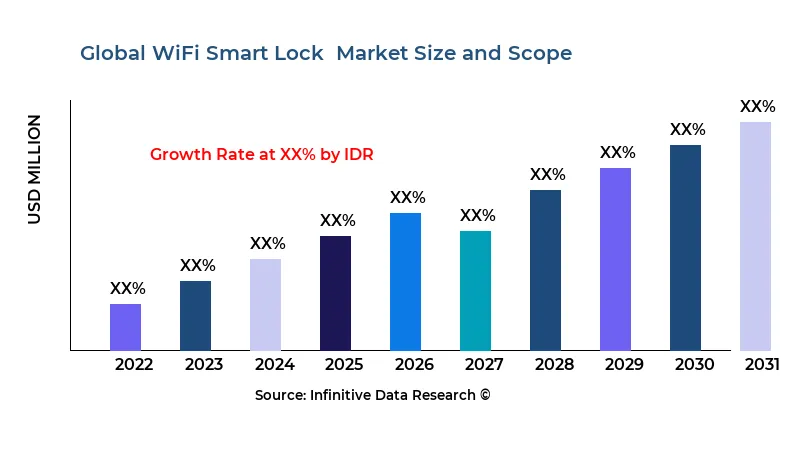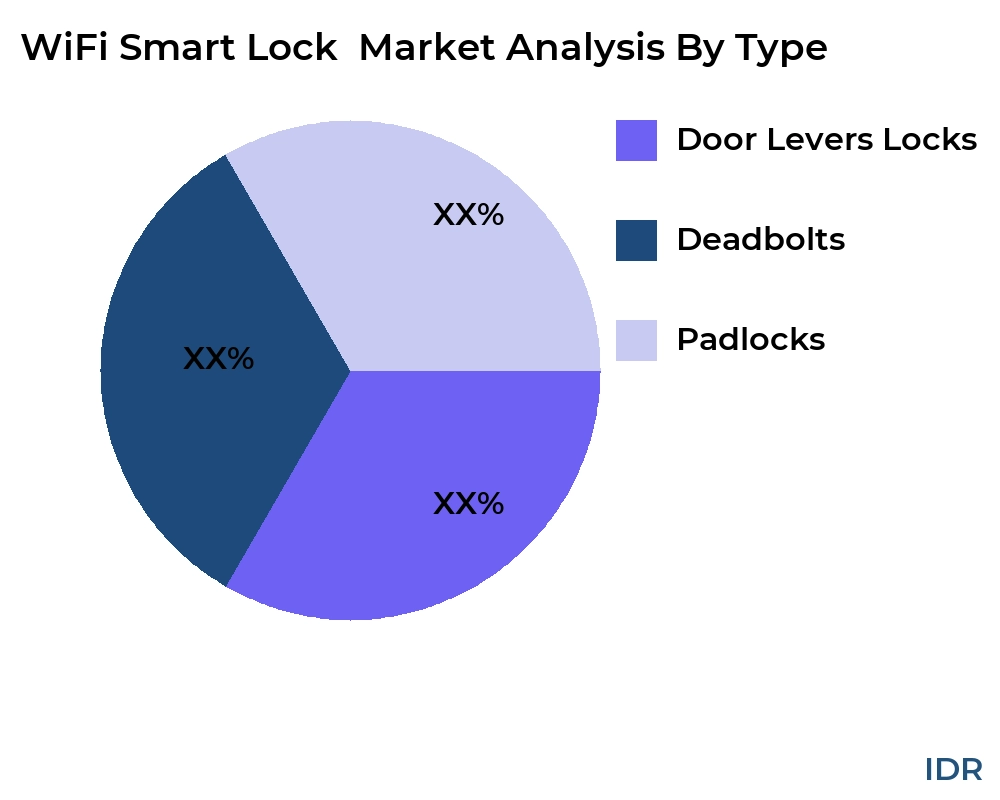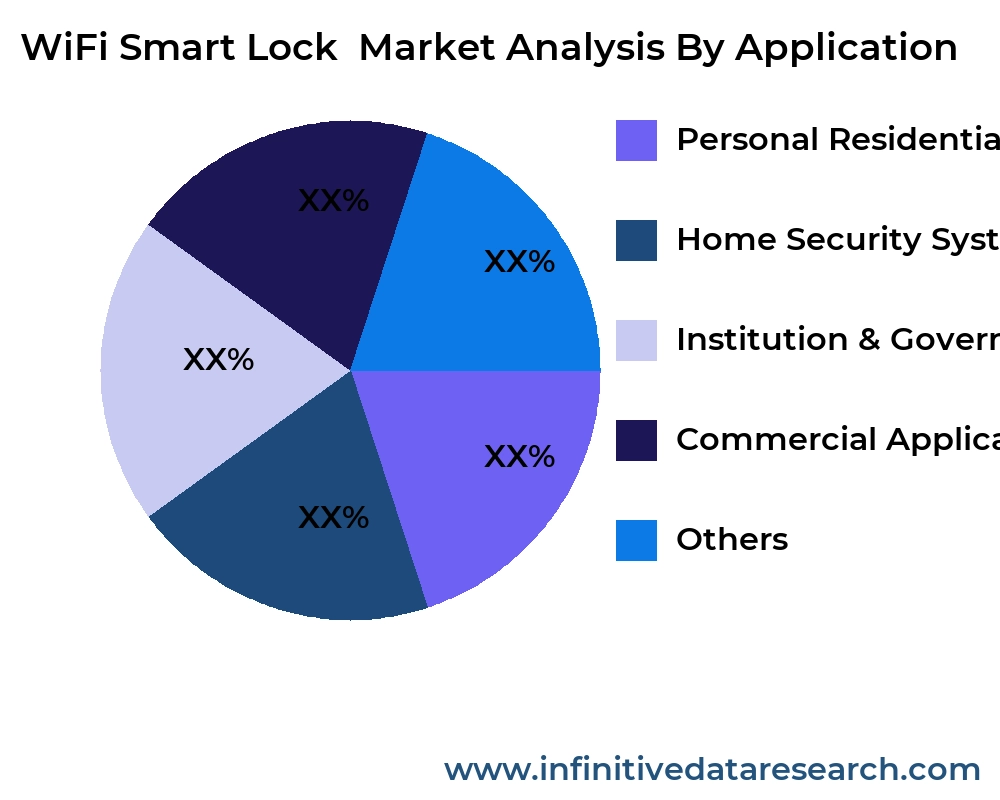WiFi Smart Lock Market Growth CAGR Overview
According to research by Infinitive Data Research, the global WiFi Smart Lock Market size was valued at USD 584 Mln (Million) in 2024 and is Calculated to reach USD 2.8 Bln (billion) by the end of 2032, growing at an anticipated compound annual growth rate (CAGR) of 12.8% during the forecast period 2024 to 2032. This projected growth is driven by its increasing adoption across Consumer Goods industries such as Personal Residential, Home Security System, Institution & Government, Commercial Applications, OthersThe WiFi Smart Lock market has been characterized by rapid technological innovation, shifting consumer preferences, and increasing demands for enhanced home security solutions. Companies are investing in research and development to integrate advanced connectivity features and robust encryption protocols, which in turn builds consumer trust. Market dynamics are influenced by rising urbanization, digitalization, and the growing integration of smart devices in everyday life. As consumers seek convenience and improved security, manufacturers are continuously enhancing product functionalities, and service providers are expanding their ecosystems to include cloud-based monitoring and remote access features.
Another significant driver in this market is the evolving regulatory landscape that has set higher standards for data security and privacy, prompting manufacturers to comply with stringent norms. This regulatory pressure has accelerated the adoption of best practices in product design and manufacturing, resulting in the emergence of innovative, more secure locking systems. The market has also seen a wave of consolidation as established players acquire smaller, innovative companies to bolster their technological portfolio and market presence.
Furthermore, consumer awareness regarding the benefits of connected home technologies is steadily rising, contributing to a larger market base and broader application areas. The interaction between convenience and enhanced security is a key factor that has positioned WiFi Smart Locks as a preferred solution in both luxury and mid-tier residential segments. The evolving customer mindset, coupled with enhanced functionalities like biometric access and voice control integration, further fuels market expansion.
Lastly, industry collaborations and partnerships between tech giants and home security companies have paved the way for integrated smart home systems. This interconnected ecosystem, where various devices communicate seamlessly, enhances overall user experience and drives the evolution of WiFi Smart Lock solutions. Manufacturers are now focusing on improving interoperability and ensuring compatibility with multiple smart home platforms, further reinforcing the market’s growth trajectory.

>>> Understand The Key Trends Shaping This Market:- Download PDF Sample
Wifi Smart Lock Market Growth Factors
One of the primary growth factors for the WiFi Smart Lock market is the surge in smart home adoption driven by increased internet penetration and the growing popularity of connected devices. As consumers become more comfortable with digital technologies, the demand for enhanced, user-friendly security systems has risen dramatically. This trend is supported by widespread marketing campaigns and increased consumer education on the benefits of smart home security solutions.
In addition to consumer-driven growth, technological advancements play a crucial role in expanding the market. The integration of advanced wireless communication protocols, such as WiFi 6 and Bluetooth, has led to more reliable and faster smart lock systems. Innovations such as remote control capabilities via mobile applications, integration with voice assistants, and improved battery life are significant factors that have contributed to higher consumer acceptance and market penetration.
Economic growth in emerging markets has also spurred the demand for WiFi Smart Locks, with increasing disposable incomes and urban development driving investment in modern security systems. Governments and private sectors are also investing in smart city projects, which include smart security systems as an integral component. These projects provide a favorable environment for market expansion by enhancing infrastructure and creating awareness about advanced security solutions.
Finally, evolving lifestyle trends such as the rise in short-term rental platforms and the increasing popularity of remote work have heightened the need for efficient and reliable access control solutions. With more people seeking secure and convenient ways to manage property access remotely, the WiFi Smart Lock market is positioned to benefit significantly. Manufacturers continue to focus on product improvements that address these trends, thus reinforcing sustained market growth.
Market Analysis By Competitors
- ASSA ABLOY
- Kwikset
- Allegion
- Dormakaba
- August
- SALTO
- nello
- Dessmann
By Product Type
- Door Levers Locks
- Deadbolts
- Padlocks
By Application
- Personal Residential
- Home Security System
- Institution & Government
- Commercial Applications
- Others
>>> Understand The Key Trends Shaping This Market:- Understand The Key Trends Shaping This Market:-
Wifi Smart Lock Market Segment Analysis
In terms of distribution channel, the WiFi Smart Lock market is segmented into online retail, offline retail, and specialized security distributors. The online segment benefits from the rapid growth of e-commerce and digital marketing, offering consumers direct access to a wide range of products and easy comparison shopping. Offline channels continue to play a significant role, particularly in regions where physical stores are preferred for personal demonstrations and immediate after-sales support. Specialized distributors often cater to large-scale projects, such as smart building integrations, thereby contributing to higher-value contracts and custom solutions.
Compatibility plays an essential role in the market as consumers increasingly demand devices that seamlessly integrate with other smart home ecosystems. Manufacturers are now focusing on ensuring that WiFi Smart Locks are compatible with popular home automation systems, mobile operating systems, and various communication protocols. This compatibility factor has become a key consideration for customers, as it enhances the overall convenience and interoperability of their connected devices. Enhanced compatibility not only broadens the market reach but also fosters consumer loyalty by ensuring a smooth, integrated experience.
Price range segmentation for WiFi Smart Locks covers low-end, mid-range, and premium products. Low-end products typically target price-sensitive segments and basic functionality, while mid-range products offer a balance between cost and advanced features such as remote control, biometric access, and app integration. Premium products are positioned with the highest level of security, luxury design, and cutting-edge technology, catering to high-end consumers and commercial applications. Each price segment has its own set of drivers and challenges, with innovation and consumer demand continually shifting the competitive landscape.
When it comes to product type, the market is broadly divided into traditional smart locks, connected smart locks, and hybrid models. Traditional smart locks have evolved to include digital access methods while still retaining mechanical components for backup security. Connected smart locks are designed to work exclusively via wireless connectivity, offering enhanced remote control and monitoring capabilities. Hybrid models combine elements of both approaches to provide an optimal mix of reliability, security, and convenience. This segmentation allows manufacturers to target a diverse customer base with tailored products that meet varying security requirements.
| REPORT ATTRIBUTES | DETAILS |
|---|---|
| Study Period |
2019-2032 |
| Base Year |
2023 |
| Forecast Period |
2024-2032 |
| Historical Period |
2019-2022 |
| Unit |
Value (USD Billion) |
| Key Companies Profiled |
ASSA ABLOY, Kwikset, Allegion, Dormakaba, August, SALTO, nello, Dessmann |
| Segments Covered |
By Product |
| Customization Scope |
Free report customization (equivalent to up to 3 analyst working days) with purchase. Addition or alteration to country, regional and segment scope |
>>> Overview of Market Analysis:- Download PDF Sample
Wifi Smart Lock Market Regional Analysis
The North American market for WiFi Smart Locks is characterized by high consumer awareness and a strong inclination towards adopting advanced smart home technologies. Here, the market is bolstered by a mature e-commerce infrastructure, significant investments in home automation, and supportive regulatory policies that emphasize security and privacy. The steady integration of smart technologies in both residential and commercial sectors continues to drive demand, further supported by strong economic conditions and high disposable incomes.
In Europe, the market is marked by a balanced mix of established home security traditions and rapidly growing smart home trends. Consumers in this region value both security and energy efficiency, leading to an increased adoption of devices that offer integrated home automation and energy management. Government initiatives promoting digital innovation and the modernisation of housing infrastructure are also key contributors to market expansion. Manufacturers are focusing on innovation and compliance with strict data protection regulations, which has spurred the introduction of more secure and versatile smart lock solutions.
The Asia-Pacific region is emerging as one of the fastest-growing markets for WiFi Smart Locks, driven by rapid urbanization, technological advancements, and increasing investments in smart city projects. The growing middle class and rising disposable incomes have accelerated consumer adoption of advanced security systems in both residential and commercial segments. Despite challenges related to price sensitivity in some markets, manufacturers are successfully introducing innovative products tailored to local needs and preferences, which is propelling significant market growth across the region.
In Latin America and the Middle East, market growth is being fueled by increasing investments in infrastructure development and heightened concerns about security. As urbanization intensifies and technological awareness increases, both regions are witnessing a gradual shift towards smart home solutions. While the market is still in a nascent stage compared to more mature regions, the potential for growth is significant. Strategic partnerships between local distributors and global technology providers are enhancing product availability and consumer confidence, thereby laying a strong foundation for future market expansion.
global WiFi Smart Lock market revenue (usd million) comparison by players 2024-2032
| Company/players | 2021 | 2022 | 2023 | 2024 | ... | (2032) |
|---|---|---|---|---|---|---|
| ASSA ABLOY | XX | XX | XX | XX | XX | XX |
| Kwikset | XX | XX | XX | XX | XX | XX |
| Allegion | XX | XX | XX | XX | XX | XX |
| Dormakaba | XX | XX | XX | XX | XX | XX |
| August | XX | XX | XX | XX | XX | XX |
| SALTO | XX | XX | XX | XX | XX | XX |
| nello | XX | XX | XX | XX | XX | XX |
| Dessmann | XX | XX | XX | XX | XX | XX |
| Total | XX | XX | XX | XX | XX | XX |
global WiFi Smart Lock market revenue (usd million) comparison by product type 2024-2032
Product Type
2023
2024
...
2032
CAGR%(2024-32)
Door Levers Locks
XX
XX
XX
XX
XX
Deadbolts
XX
XX
XX
XX
XX
Padlocks
XX
XX
XX
XX
XX
Total
XX
XX
XX
XX
XX
| Product Type | 2023 | 2024 | ... | 2032 | CAGR%(2024-32) |
|---|---|---|---|---|---|
| Door Levers Locks | XX | XX | XX | XX | XX |
| Deadbolts | XX | XX | XX | XX | XX |
| Padlocks | XX | XX | XX | XX | XX |
| Total | XX | XX | XX | XX | XX |
global WiFi Smart Lock market revenue (usd million) comparison by application 2024-2032
Application
2023
2024
...
2032
CAGR%(2024-32)
Personal Residential
XX
XX
XX
XX
XX
Home Security System
XX
XX
XX
XX
XX
Institution & Government
XX
XX
XX
XX
XX
Commercial Applications
XX
XX
XX
XX
XX
Others
XX
XX
XX
XX
XX
Total
XX
XX
XX
XX
XX
| Application | 2023 | 2024 | ... | 2032 | CAGR%(2024-32) |
|---|---|---|---|---|---|
| Personal Residential | XX | XX | XX | XX | XX |
| Home Security System | XX | XX | XX | XX | XX |
| Institution & Government | XX | XX | XX | XX | XX |
| Commercial Applications | XX | XX | XX | XX | XX |
| Others | XX | XX | XX | XX | XX |
| Total | XX | XX | XX | XX | XX |
>>> Market Understand Through Graph And Chart:- Download PDF Sample


Wifi Smart Lock Market Competitive Insights
The competitive landscape in the WiFi Smart Lock market is highly fragmented, with a mix of established players and innovative startups vying for market share. Industry giants continue to dominate the market by leveraging their strong brand presence and extensive distribution networks, while startups are rapidly gaining traction with breakthrough technologies and agile business models. This dynamic competition is driving continuous innovation and pushing companies to differentiate their products through advanced features, superior design, and enhanced connectivity options.
Market players are focusing on strategic collaborations, mergers, and acquisitions to strengthen their product portfolios and expand their geographic reach. Such alliances allow companies to integrate complementary technologies and address a broader range of consumer needs. The competitive environment is also characterized by a race to achieve better interoperability with various smart home platforms, which is seen as a critical factor for success. Companies are investing heavily in research and development to ensure their offerings remain competitive in a fast-evolving market.
Another key aspect of the competitive scenario is the importance of after-sales service and customer support. Leading companies are not only competing on product features but also on the quality of customer interactions and post-purchase service. This focus on customer experience is helping companies build stronger brand loyalty and secure recurring revenue streams through subscription-based services and maintenance contracts. The drive to offer comprehensive solutions that cover both hardware and software needs is reshaping the competitive landscape.
Additionally, competitive pressures are leading to significant pricing strategies, with companies frequently introducing promotional offers and bundling services to attract price-sensitive segments. This aggressive pricing coupled with enhanced product features is intensifying market competition and compelling players to innovate continuously. In this environment, companies that are able to strike the right balance between cost, quality, and innovation are best positioned to succeed in capturing market share and achieving sustainable growth.
Wifi Smart Lock Market Competitors
United States:
• August Home
• Kwikset
• Schlage
• Yale
• Level Lock
Germany:
• ABUS
• Bosch Security Systems
• GEZE
• Siedle
• Hoppe
United Kingdom:
• Lockitron
• Danalock
• Yale
• Nuki
• TruVoice
China:
• Xiaomi
• Hikvision
• Dahua Technology
• Qrio
• Samsung (China operations)
Japan:
• Sony
• Panasonic
• Hitachi
• Omron
• Toshiba
South Korea:
• Samsung SmartThings
• LG Electronics
• KT Tech
• Hanwha Techwin
• Doowon
Wifi Smart Lock Market Top Competitors
The competitive field in the WiFi Smart Lock market is headlined by several key players that have established strong positions over time. August Home has gained prominence by offering sleek, user-friendly smart locks that integrate effortlessly with modern smart home systems. Its innovative approach and continuous product enhancements have enabled it to secure a significant market share and maintain a leadership position among tech-savvy consumers.
Kwikset has carved out a niche in the market by balancing affordability with advanced technology. With a reputation for reliability and ease of installation, Kwikset’s product portfolio appeals to a wide range of customers from residential to commercial sectors. Their steady investment in R&D and broad distribution network have reinforced their status as a trusted name in home security.
Schlage stands out due to its long history in the door hardware market combined with modern smart lock innovations. The company’s strong brand legacy and focus on integrating robust security features with cutting-edge connectivity have helped it maintain a competitive edge. Schlage’s continuous improvements and global market reach underpin its position as one of the top players in the industry.
Yale has successfully transitioned from traditional lock systems to smart, connected solutions by leveraging its extensive industry experience and a strong brand reputation. Its product offerings are known for their durability, ease of use, and comprehensive security features, making Yale a preferred choice among consumers seeking both reliability and innovation. Yale’s strategic global expansion and focus on customer satisfaction have bolstered its competitive standing.
Level Lock has emerged as an innovative challenger with a focus on minimalist design and streamlined functionality. By emphasizing simplicity and secure connectivity, Level Lock has attracted a niche segment of consumers who value both aesthetics and performance. Their forward-thinking product development and integration with popular home automation platforms have positioned them as a significant competitor in the market.
Lockitron has also made a mark with its pioneering approach to smart locks, offering seamless integration with various smart home systems. Its user-centric design and emphasis on remote access capabilities have resonated well with a modern, mobile-first customer base. Lockitron’s continuous evolution in design and technology has ensured its continued relevance in an increasingly competitive market.
Danalock is recognized for its robust security solutions and high compatibility with multiple platforms. The company has built a strong reputation by focusing on the balance between technological innovation and user-friendly interfaces. Danalock’s emphasis on providing reliable and secure products has helped it capture a substantial segment of the market and maintain competitive momentum.
Nuki, with its focus on ease of integration and smart home interoperability, has rapidly grown its market presence. Its products are engineered to work seamlessly with popular home automation systems, providing both convenience and enhanced security. Nuki’s commitment to continuous innovation and user satisfaction has cemented its position among the top smart lock competitors.
Xiaomi leverages its extensive ecosystem and competitive pricing to gain traction in the smart lock market. With a broad portfolio that integrates with its other smart home devices, Xiaomi appeals to cost-conscious consumers who do not want to compromise on quality or functionality. Its aggressive market strategy and widespread brand recognition have propelled it to the forefront in many emerging markets.
Hikvision, primarily known for its surveillance solutions, has also extended its expertise into the smart lock segment. By integrating advanced connectivity features with robust security protocols, Hikvision has established itself as a key player capable of serving both residential and commercial markets. Its expansive global network and consistent innovation efforts underscore its competitive positioning in the WiFi Smart Lock industry.
The report provides a detailed analysis of the WiFi Smart Lock market across various regions, highlighting the unique market dynamics and growth opportunities in each region.
- US
- Canada
- Mexico
- UK
- Germany
- France
- Italy
- Russia
- Spain
- Switzerland
- Austria
- Belgium
- Rest of Europe
- China
- Japan
- South Korea
- Indonesia
- Vietnam
- Philippines
- Australia
- Thailand
- Singapore
- Rest of APAC
- UAE
- Saudi Arabia
- Egypt
- South Africa
- Israel
- Rest of MEA
- Brazil
- Argentina
- Rest of Latin America
>>> Need A Different Region Or Segment? Download PDF Sample
Key Takeaways
- The global WiFi Smart Lock market is expected to grow significantly from 2024 to 2032, driven by technological advancements, increasing demand, and government investments in urbanization.
- The market is characterized by a diverse range of manufacturers, product types, and applications, catering to different consumer needs and preferences.
- Regional insights highlight the unique market dynamics and growth opportunities in various regions, including North America, Europe, Asia-Pacific, Latin America, and the Middle East & Africa.
- The competitive landscape features key players who have created a dynamic and diverse market environment through collaborations, mergers and acquisitions, and innovative product developments.
- Market trends such as technological advancements, sustainability, customization, and digital transformation are shaping the growth and development of the WiFi Smart Lock market.
- Despite the positive outlook, the market faces challenges such as regulatory compliance, high initial investment costs, and economic uncertainties.
- The report provides comprehensive coverage of market size, market share, growth factors, and strategic insights to help businesses navigate the dynamic WiFi Smart Lock market and achieve long-term success.
By leveraging the information provided in this report, businesses can develop effective strategies, address market challenges, and capitalize on growth opportunities to ensure sustainable growth and long-term success in the global WiFi Smart Lock market.
- Introduction
- Objectives of the Study
- Market Definition
- Research Scope
- Currency
- Key Target Audience
- Research Methodology and Assumptions
- Executive Summary
- Premium Insights
- Porter’s Five Forces Analysis
- Value Chain Analysis
- Top Investment Pockets
- Industry Trends
- Market Dynamics
- Market Evaluation
- Drivers
- Restraints
- Opportunities
- Challenges
- Global WiFi Smart Lock Market Analysis and Projection, By Companies
- Segment Overview
- ASSA ABLOY
- Kwikset
- Allegion
- Dormakaba
- August
- SALTO
- nello
- Dessmann
- Global WiFi Smart Lock Market Analysis and Projection, By Type
- Segment Overview
- Door Levers Locks
- Deadbolts
- Padlocks
- Global WiFi Smart Lock Market Analysis and Projection, By Application
- Segment Overview
- Personal Residential
- Home Security System
- Institution & Government
- Commercial Applications
- Others
- Global WiFi Smart Lock Market Analysis and Projection, By Regional Analysis
- North America
- US
- Canada
- Mexico
- Europe
- UK
- Germany
- France
- Italy
- Russia
- Spain
- Switzerland
- Austria
- Belgium
- Rest of Europe
- Asia Pacific
- China
- Japan
- South Korea
- Indonesia
- Vietnam
- Philippines
- Australia
- Thailand
- Singapore
- Rest of APAC
- Middle East
- UAE
- Saudi Arabia
- Egypt
- South Africa
- Israel
- Rest of MEA
- Latin America
- Brazil
- Argentina
- Rest of Latin America
- Global WiFi Smart Lock Market-Competitive Landscape
- Overview
- Market Share of Key Players in the WiFi Smart Lock Market
- Global Company Market Share
- North America Company Market Share
- Europe Company Market Share
- APAC Company Market Share
- Competitive Situations and Trends
- Coverage Launches and Developments
- Partnerships, Collaborations, and Agreements
- Mergers & Acquisitions
- Expansions
- Company Profiles
- ASSA ABLOY
- Business Overview
- Company Snapshot
- Company Market Share Analysis
- Company Coverage Portfolio
- Recent Developments
- SWOT Analysis
- Kwikset
- Business Overview
- Company Snapshot
- Company Market Share Analysis
- Company Coverage Portfolio
- Recent Developments
- SWOT Analysis
- Allegion
- Business Overview
- Company Snapshot
- Company Market Share Analysis
- Company Coverage Portfolio
- Recent Developments
- SWOT Analysis
- Dormakaba
- Business Overview
- Company Snapshot
- Company Market Share Analysis
- Company Coverage Portfolio
- Recent Developments
- SWOT Analysis
- August
- Business Overview
- Company Snapshot
- Company Market Share Analysis
- Company Coverage Portfolio
- Recent Developments
- SWOT Analysis
- SALTO
- Business Overview
- Company Snapshot
- Company Market Share Analysis
- Company Coverage Portfolio
- Recent Developments
- SWOT Analysis
- nello
- Business Overview
- Company Snapshot
- Company Market Share Analysis
- Company Coverage Portfolio
- Recent Developments
- SWOT Analysis
- Dessmann
- Business Overview
- Company Snapshot
- Company Market Share Analysis
- Company Coverage Portfolio
- Recent Developments
- SWOT Analysis
List of Table
- Drivers of Global WiFi Smart Lock Market: Impact Analysis
- Restraints of Global WiFi Smart Lock Market: Impact Analysis
- Global WiFi Smart Lock Market, By Technology, 2023-2032(USD Billion)
- global Door Levers Locks, WiFi Smart Lock Market, By Region, 2023-2032(USD Billion)
- global Deadbolts, WiFi Smart Lock Market, By Region, 2023-2032(USD Billion)
- global Padlocks, WiFi Smart Lock Market, By Region, 2023-2032(USD Billion)
- global Personal Residential, WiFi Smart Lock Market, By Region, 2023-2032(USD Billion)
- global Home Security System, WiFi Smart Lock Market, By Region, 2023-2032(USD Billion)
- global Institution & Government, WiFi Smart Lock Market, By Region, 2023-2032(USD Billion)
- global Commercial Applications, WiFi Smart Lock Market, By Region, 2023-2032(USD Billion)
- global Others, WiFi Smart Lock Market, By Region, 2023-2032(USD Billion)
List of Figures
- Global WiFi Smart Lock Market Segmentation
- WiFi Smart Lock Market: Research Methodology
- Market Size Estimation Methodology: Bottom-Up Approach
- Market Size Estimation Methodology: Top-down Approach
- Data Triangulation
- Porter’s Five Forces Analysis
- Value Chain Analysis
- Top investment pocket in the WiFi Smart Lock Market
- Top Winning Strategies, 2023-2032
- Top Winning Strategies, By Development, 2023-2032(%)
- Top Winning Strategies, By Company, 2023-2032
- Moderate Bargaining power of Buyers
- Moderate Bargaining power of Suppliers
- Moderate Bargaining power of New Entrants
- Low threat of Substitution
- High Competitive Rivalry
- Restraint and Drivers: WiFi Smart Lock Market
- WiFi Smart Lock Market Segmentation, By Technology
- WiFi Smart Lock Market For Live Attenuated, By Region, 2023-2033 ($ Billion)
- Global WiFi Smart Lock Market, By Technology, 2023-2032(USD Billion)
- global Door Levers Locks, WiFi Smart Lock Market, By Region, 2023-2032(USD Billion)
- global Deadbolts, WiFi Smart Lock Market, By Region, 2023-2032(USD Billion)
- global Padlocks, WiFi Smart Lock Market, By Region, 2023-2032(USD Billion)
- global Personal Residential, WiFi Smart Lock Market, By Region, 2023-2032(USD Billion)
- global Home Security System, WiFi Smart Lock Market, By Region, 2023-2032(USD Billion)
- global Institution & Government, WiFi Smart Lock Market, By Region, 2023-2032(USD Billion)
- global Commercial Applications, WiFi Smart Lock Market, By Region, 2023-2032(USD Billion)
- global Others, WiFi Smart Lock Market, By Region, 2023-2032(USD Billion)
- ASSA ABLOY: Net Sales, 2023-2033 ($ Billion)
- ASSA ABLOY: Revenue Share, By Segment, 2023 (%)
- ASSA ABLOY: Revenue Share, By Region, 2023 (%)
- Kwikset: Net Sales, 2023-2033 ($ Billion)
- Kwikset: Revenue Share, By Segment, 2023 (%)
- Kwikset: Revenue Share, By Region, 2023 (%)
- Allegion: Net Sales, 2023-2033 ($ Billion)
- Allegion: Revenue Share, By Segment, 2023 (%)
- Allegion: Revenue Share, By Region, 2023 (%)
- Dormakaba: Net Sales, 2023-2033 ($ Billion)
- Dormakaba: Revenue Share, By Segment, 2023 (%)
- Dormakaba: Revenue Share, By Region, 2023 (%)
- August: Net Sales, 2023-2033 ($ Billion)
- August: Revenue Share, By Segment, 2023 (%)
- August: Revenue Share, By Region, 2023 (%)
- SALTO: Net Sales, 2023-2033 ($ Billion)
- SALTO: Revenue Share, By Segment, 2023 (%)
- SALTO: Revenue Share, By Region, 2023 (%)
- nello: Net Sales, 2023-2033 ($ Billion)
- nello: Revenue Share, By Segment, 2023 (%)
- nello: Revenue Share, By Region, 2023 (%)
- Dessmann: Net Sales, 2023-2033 ($ Billion)
- Dessmann: Revenue Share, By Segment, 2023 (%)
- Dessmann: Revenue Share, By Region, 2023 (%)
Infinitive Data Research provides comprehensive market research, offering in-depth market analysis to help companies understand their target market and industry competition. This research predicts the market acceptance of your brand and products, ensuring informed decision-making for business success.
Competitor Analysis in the WiFi Smart Lock Industry
Conducting a competitor analysis involves identifying competitors within the WiFi Smart Lock industry and studying their various marketing strategies. This comparative data allows you to assess your company's strengths and weaknesses relative to competitors, providing insights to enhance your market position.
Importance of Continuous Market Research
Consistently conducting market research is essential for minimizing risk at every stage of business operations. WiFi Smart Lock market research enables you to collect qualitative and quantitative data, which, when properly analyzed, leads to wise decisions that align with user and customer needs. Below are some crucial lessons learned through the WiFi Smart Lock market research process:

Key Dimensions of WiFi Smart Lock Market Analysis
- Trend and Pattern Identification: Analyzing data to spot market trends and patterns.
- Pricing Analysis: Assessing keyword pricing strategies.
- Actionable Insights: Implementing insights derived from data analysis.
- Market Potential: Evaluating the potential of the WiFi Smart Lock market.
- Competitor Analysis: Studying competitors' strategies and performance.
- Location Analysis: Assessing optimal locations for market penetration.
- Distribution Channels Analysis: Evaluating the effectiveness of distribution channels.
- Market Size and Growth Rate: Measuring market size and growth potential.
- Market Profitability: Assessing profitability prospects.
- Key Success Factors: Identifying critical factors for success.
- Cost Structure: Understanding the cost structure within the WiFi Smart Lock industry.
Target Audience for the Report
This report is valuable for a diverse audience, including:
- WiFi Smart Lock Market Manufacturers: To understand market dynamics and enhance production strategies.
- Investors and Financing Companies: To assess investment opportunities and risks.
- WiFi Smart Lock Market Suppliers: To identify market demands and supply chain efficiencies.
Necessity of the Report
Making Crucial Business Decisions
Understanding the WiFi Smart Lock market, competition, and industry landscape is vital for making informed business decisions. Without current and relevant market research, decisions may be based on outdated or irrelevant information, potentially harming the business.
Securing Investment Funds
Attracting investors requires demonstrating thorough market research. Investors need assurance that you understand the sector, current and potential competition, and whether your idea addresses a market need.
Identifying New Business Opportunities
WiFi Smart Lock market research goes beyond understanding trends and consumer behavior. It identifies new revenue streams and opportunities for business pivots. These insights can lead to strategic changes in the business model, promoting growth and adapting to market challenges.
Avoiding Business Failures
Market research also plays a crucial role in risk mitigation. It can reveal when not to pursue certain actions, saving the company from potential losses in revenue, brand image, and more. This proactive approach is often overlooked but is essential for long-term success.
Conclusion
Infinitive Data Research's comprehensive WiFi Smart Lock market research provides critical insights for making solid business decisions, securing investments, identifying new opportunities, and avoiding potential failures. Understanding market dynamics through continuous research ensures your company remains competitive and thrives in the WiFi Smart Lock industry.




